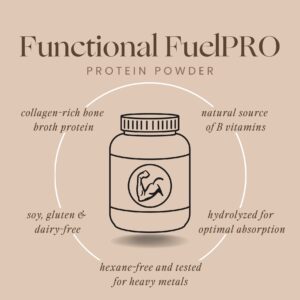Best Protein Powder for Women: What to Look For When Purchasing & How to Determine the Best One for You
The world of protein powders can be overwhelming! Despite the challenge of navigating confusing health claims, added ingredients, and varying textures and flavors, protein powders can serve as a useful tool to help meet your protein needs.
Let’s dive into the variety of protein powder options available, as well as why quality matters when choosing a protein powder. We’ll also share what we believe is the best protein powder for women!
An Overview of Protein Powder Options
Plant-based protein powders are many times made up of pea protein, or more often than not, a blend of different plant protein sources (i.e. pea, hemp, pumpkin seed, chia seed, flax seed, brown rice, etc.).
Unfortunately, the majority of plant proteins (with the exception of soy) are incomplete protein sources. This means that they do not contain all 9 essential amino acids that we have to get through food. This contributes to the fact that they often have a lower digestibility and absorption score than animal proteins, again, with the exception of soy protein. However, we don’t recommend soy protein, as soy should always be consumed in its most natural state, such as edamame.
Many plant proteins contain anti-nutrients, such as phytic acid, tannins, oxalates, as well as heavy metals, which can inhibit the absorption of beneficial nutrients, such as minerals and amino acids.
When it comes to animal proteins, you can find everything from whey and casein, both derived from dairy, to egg protein, bone broth protein, collagen peptides, and beef protein isolate.
Collagen peptides are animal-based, although unlike other animal-based protein sources, are not a complete protein source since they do not contain all of the essential amino acids. Without the complete amino acid profile, muscle protein synthesis cannot be properly stimulated, so collagen shouldn’t be used as a sole dietary protein source, or after exercise. That being said, collagen is a great source of amino acids glycine, proline, and hydroxyproline, which support skin, joint, and connective tissue health.
Why Quality Matters
Because protein powders are considered supplements, there is no FDA oversight or quality regulations. Thankfully, companies like Clean Label Project, a non-profit organization working to shed light on transparent food and consumer product labeling, complete their own safety testing of products like protein powder.
When they tested over 130 popular protein powders for endocrine disruptors, heavy metals, and other harmful substances, they found that nearly 75% of plant-based protein powders contain lead. And 55% of protein powders, among all types tested, were found to contain BPA, a known endocrine disruptor.
Note that opting for organic plant-based protein powder does not necessarily protect you from heavy metal exposure, as these metals come from the soil as opposed to farming practices. While organic samples, a majority of which were plant-based, were found to have less BPA, they on average contained over 2 times the amount of heavy metals.
Hexane is a chemical often used to produce plant-based, and sometimes whey, protein powders to separate the nutrients so that the proteins can be isolated. While most adverse effects related to hexane, such as nervous system toxicity, are seen when hexane is inhaled, there is not enough evidence suggesting that hexane is actually safe when consumed. For that reason, we strongly recommend ensuring your protein powder is hexane-free.
Another thing to consider are the type of sweeteners and other added ingredients. Natural sweeteners like organic stevia and monk fruit can better support blood sugar regulation compared to cane sugar and even organic coconut sugar. We recommend avoiding artificial sweeteners, such as aspartame and sucralose, for their potential to fuel inflammation and disrupt the gut microbiome.
The Best Protein for Women
Bone broth protein is a rich source of collagen, as well as amino acids glycine, arginine, and glutamine, which provide all of the benefits of collagen as well as being especially healing for the gut lining.
The benefits of bone broth proteins go a step beyond collagen, especially if they are further hydrolyzed into peptide form. Some of these formulas may also be called hydrolyzed beef protein, and are a great option for those who have compromised digestive function given its optimal absorption.
These protein powders contain all essential amino acids to be a complete protein source, and also contain essential vitamins like vitamins A and D, as well as natural forms of B vitamins, as opposed to synthetic B vitamins that may be added to some protein powders.
Finally, it’s important that women consume adequate amounts of protein at any given time, in order to hit the appropriate leucine threshold, one of the essential amino acids. We can do so by ensuring that in each meal you are getting at least 25-30 grams of protein.
We could not be more excited to introduce you to Functional FuelPRO, our very own Functional Fueling protein powder, available now!
Functional FuelPRO is a hydrolyzed bone broth protein that is dairy-free, gluten-free, hexane-free, and third party tested for heavy metals. It’s lightly sweetened with stevia, has no funky aftertaste, and is naturally packed with collagen, B vitamins, vitamin A, and vitamin D. Use Functional FuelPRO as a post-workout protein option or as part of a meal!
If you’re unsure of your protein needs and would like support with a personalized nutrition, supplement, and lifestyle plan, be sure to check out our 1:1 coaching program.

Written by Romana Brennan, MS, RD
Comments +